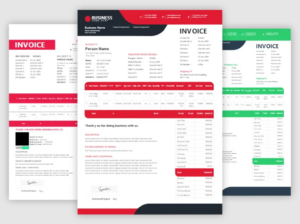Introduction
NetSuite Accounting Software is a software that does more than just crunch numbers. It’s cloud-based and simplifies your financial operations with features like real-time data access, automated reporting, and compliance with accounting standards. It offers you efficiency and scalability right out of the gate.
What makes NetSuite even better? It seamlessly integrates with other essential functions like HR, inventory, and e-commerce—so you can manage your entire business in one place.
If you run a small operation or you’re not ready to tackle a system with high upfront costs and a bit of a learning curve, NetSuite might feel like too much. While its powerful automation and multi-functional features are perfect for your expanding business, it can be more complex than you need if you’re keeping things simple.
LET’S CUT TO THE CHASE!
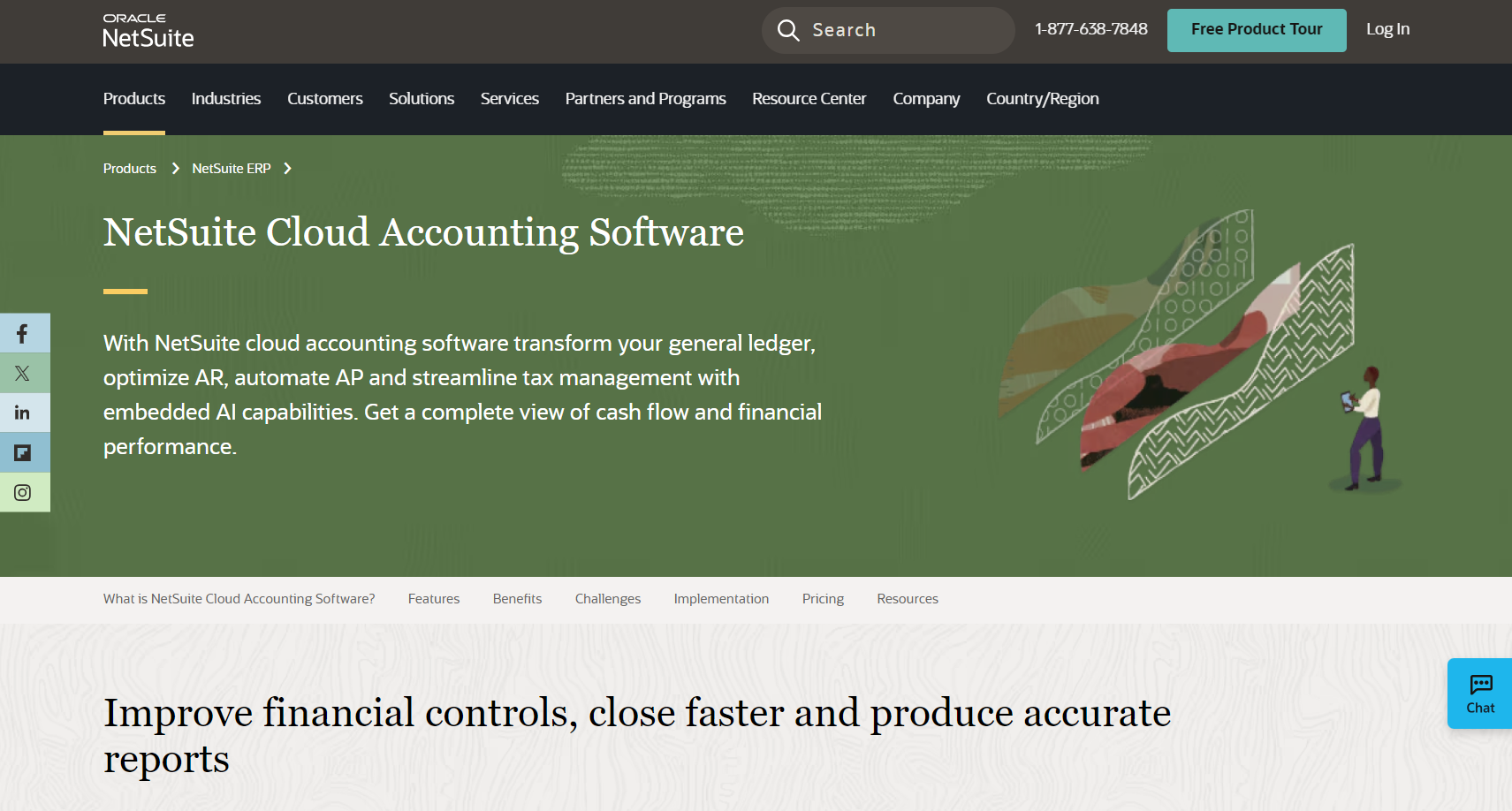
- You’re looking to automate repetitive financial tasks and reduce manual data entry.
- You need real-time visibility into your financial data to make precise decisions.
- Your business is growing, and you want scalable accounting software that integrates with other business functions like HR, inventory, and e-commerce.
- You want to streamline your financial close process, eliminate inefficiencies, and accelerate month-end reporting.
- Your business relies heavily on custom, on-premise software solutions, as NetSuite’s cloud-based model may not align with your current IT infrastructure.
- Your company is not ready for the transition to automatic processes since NetSuite significantly reduces the demand for manual accounting tasks.
- Your financial operations are small-scale or highly simplified, and the depth of NetSuite’s features might be more than you need.
- You are not ready to invest in both the initial setup fees and ongoing subscription costs for NetSuite, which may not be ideal for your small or early-stage company.
NetSuite Cloud Accounting Software is your do-it-all solution that smooths the process of accounting. With features that automate tasks, boost accuracy, and deliver real-time financial insights, it keeps your numbers in check. And the best part? It syncs effortlessly with other key functions like HR and inventory management.
Being cloud-based, NetSuite also offers you the flexibility of remote access, so you can manage your finances wherever you are. That’s a major win for your business if it has teams working at different locations or on-the-go leadership.
The cost—including both subscription fees and one-time implementation charges—can be a stumbling block for your small enterprise. While NetSuite provides robust capabilities that help your company work out complex operations, it might be a bit too much if its requirements are simpler.
NOW, LET’S DETAIL THINGS FOR YOU.
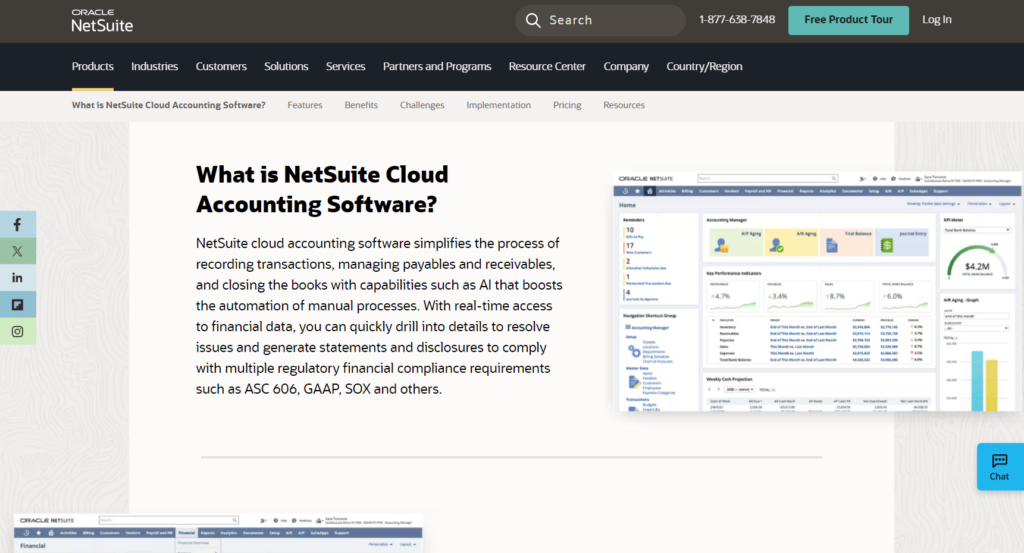
Imagine managing all your financial processes—from payables to compliance—with ease while eliminating the stress of manual tasks. That’s exactly what NetSuite Cloud Accounting Software delivers. It simplifies the complexity of finance, giving you real-time insights into the financial health of your business.
What really sets NetSuite apart? Automation. Say goodbye to tedious data entry and hello to simple processes that free up your time for what truly matters—growing your business. Its pricing is both straightforward and flexible. You start with an annual subscription, which gives you access to the core platform. All you have to do is reach out to its sales team through the sales chatbot.
Desire extra features like tax management or accounts receivable? No problem. You can add features as necessary, tailoring the software to fit your business perfectly. As your team expands, adding new users is a piece of cake—no need for complicated setups or extra hassle. Plus, there’s a one-time implementation fee that ensures everything fits your specific demands right from the start.
NetSuite isn’t just an accounting tool. It integrates seamlessly with other NetSuite modules, so you get a full system that upgrades alongside your business. Whether you own a startup or a well-established company, the cloud-based approach means you can focus on scaling, not juggling outdated spreadsheets or worrying about compliance.
What’s the Catch with NetSuite Accounting Software?
NetSuite offers you a solid suite of accounting features that streamline processes and boost efficiency, but there are a few factors to keep in mind when considering this solution.
First, NetSuite’s annual license fee is not one-size-fits-all. The cost structure depends on your core platform necessities, optional modules, and the number of users. While this modular approach offers you flexibility, it also means costs can rise quickly as your business grows and you add more features or users. Additionally, there is a one-time implementation fee, which can be substantial, especially for your small business.
Another point to consider is the learning curve. NetSuite’s powerful functionality comes with complexity, so your team may require significant training to fully utilize the platform. This can add time and cost to your overall investment.
Finally, while NetSuite’s automation capabilities can save time, it may not be a perfect fit for your business model. If your company has highly specialized accounting specifications for effective work, you need to ensure that the platform can handle your needs without excessive customization, which can drive up expenses.
>>> PRO TIPS: Invoicely Billing Software Review
WHAT YOU NEED TO KNOW
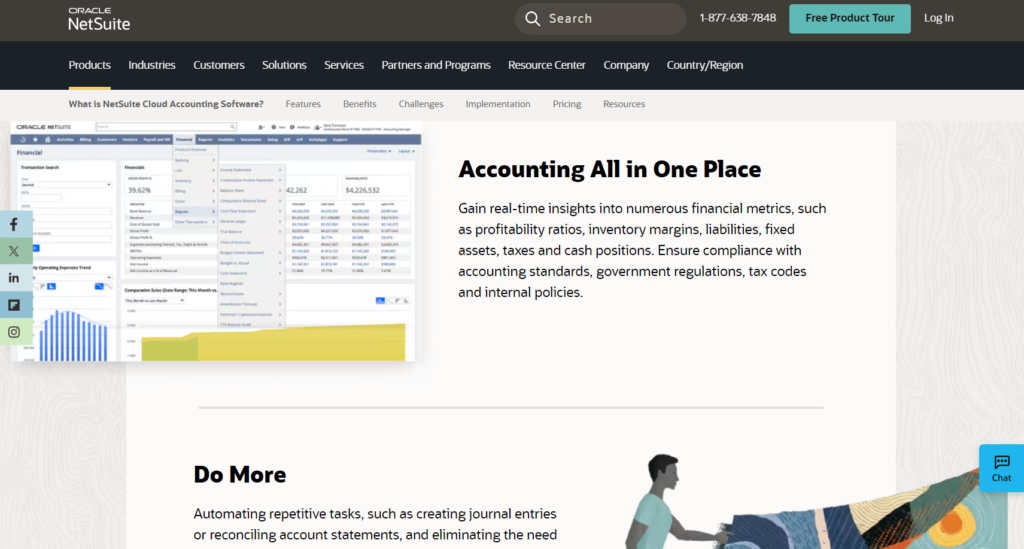
NetSuite’s cloud accounting software isn’t just another financial tool—it’s your all-in-one solution for managing everything accounting, from general ledger tasks to tax management. Think about automating all the time-consuming manual processes so your finance team can stop drowning in data entry and start focusing on what really matters—spotting trends and boosting your company’s financial performance.
Picture this: real-time access to your financial data, whether you’re in the office or working remotely. Keep tabs on essential metrics like profitability, cash flow, and liabilities, no matter where you are. Plus, with NetSuite, compliance headaches are a thing of the past. It meets key regulatory standards like GAAP and SOX, so if your business needs to stick to strict guidelines, you have it.
And here’s the cherry on top—NetSuite grows with you. Its flexible pricing model operates on an annual subscription, with optional add-ons for more advanced features. So as your business scales, you can easily tack on new modules and users, all while keeping everything—from accounting to HR to inventory—under one central platform.
What are NetSuite Accounting Software Competitors Offering?
NetSuite vs. Sage Intacct: Sage Intacct provides you with a robust cloud-based financial management system that helps your expanding business. Its core strengths lie in automating key financial processes like accounts payable and receivable, multi-entity consolidations, and real-time reporting. Sage Intacct’s intuitive dashboards help your business make data-driven decisions, offering it flexibility for complex organizational structures with multi-entity support. NetSuite and Sage Intacct both go beyond just accounting functions to work well with HR and inventory management features.
NetSuite vs. QuickBooks Online: QuickBooks Online has a reputation for its ease of use and affordability, making it a go-to for your small business. With features like receipt tracking, real-time income and expense monitoring, and a user-friendly mobile app, it streamlines your basic accounting tasks. While it might not offer the same depth as NetSuite, QuickBooks excels at providing accessible tools for your business with flexible pricing tiers.
NetSuite vs. Odoo: Odoo is an open-source platform that gives you customizable business applications, from CRM and sales to inventory and accounting. Its seamless module integration allows your company to manage various functions from one place, promoting efficiency. Odoo’s scalability and flexibility cater to your business, no matter its size, though its feature depth may not match NetSuite’s advanced financial tools.
What Affects NetSuite Accounting Software Prices?
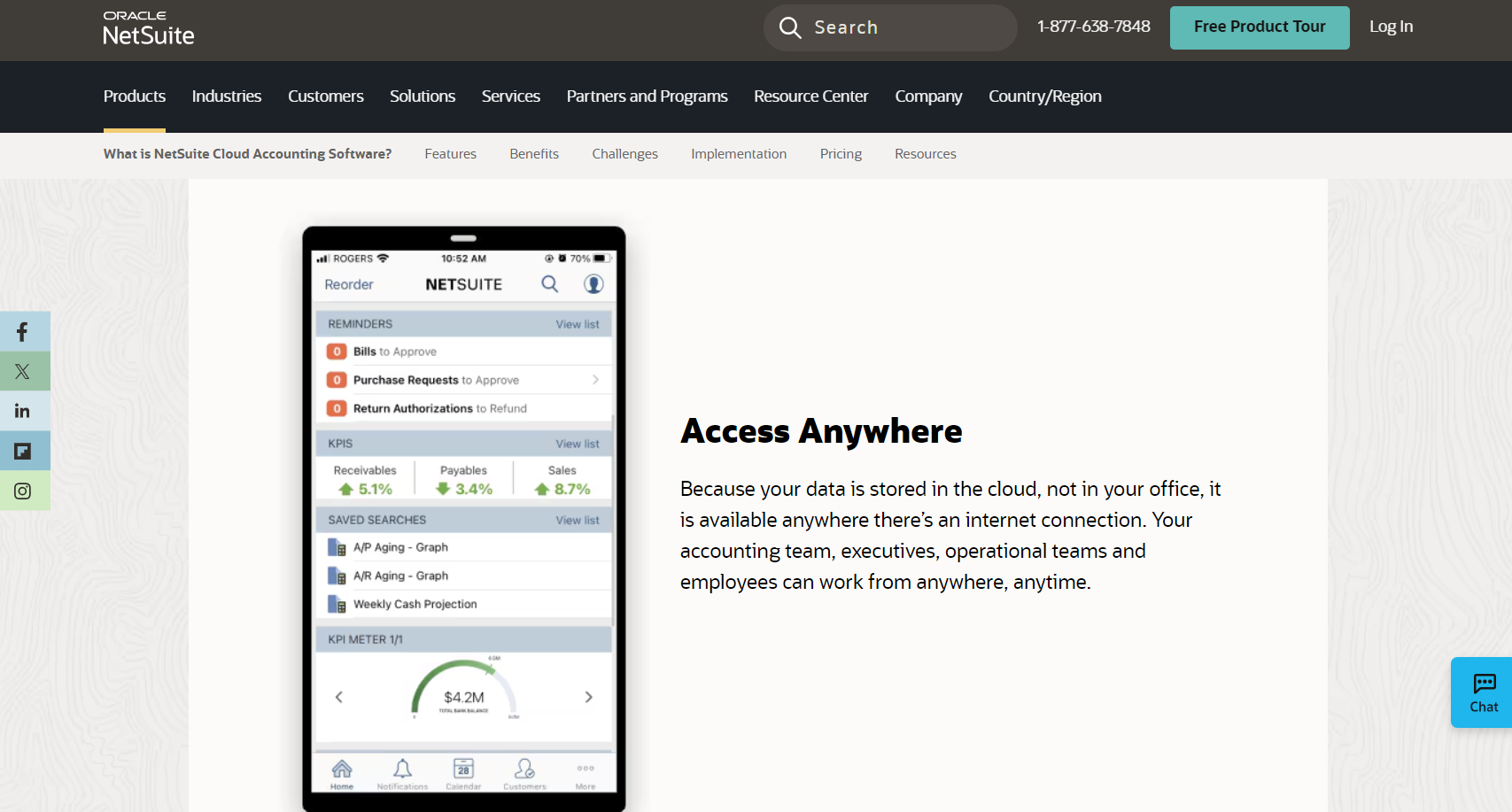
Number of Users: The number of users that have access to the platform also affects the price. Your business has to account for how many employees or departments require access to the software.
Core Platform License: The base subscription to NetSuite’s core accounting and financial management features is an essential part of the pricing model. This covers the foundational functions necessary for your accounting tasks.
Optional Modules: NetSuite offers additional modules that you can add to the core platform, such as tax management, inventory control, or HR features. The cost increases depending on which extra modules your company chooses to incorporate.
Implementation Costs: There is a one-time setup or implementation fee that covers your initial configuration and onboarding of the software. The complexity of the implementation may increase these costs.
Scalability and Growth: As your business expands, it may have to activate more modules and add new users, which affects the overall subscription price.
What Affects Prices in the Industry Overall?
Feature Set and Functionality: Advanced software with features like automation, AI integration, compliance management, and multi-entity support tends to have high prices. You find that simple solutions with basic functionalities are usually more affordable.
Scalability and Customization: Software that allows for easy scalability, such as adding new users or activating additional modules as your business grows, often comes with a modular pricing structure. This can impact the overall cost depending on the customization it needs.
Subscription Model: Most cloud-based accounting platforms like Zoho Books use a subscription pricing model. The cost varies based on the number of users, the features you need, and additional services like advanced inventory, analytics, or essential support.
Implementation Fees: Many providers charge you a one-time setup or implementation fee to cover the onboarding process, including customization, data migration, and initial setup.
Cloud vs. Local Deployment: Cloud-based solutions tend to have a lower upfront cost since there is no prerequisite for extensive hardware or infrastructure. However, on-premise solutions often require you to make higher initial investments in hardware and maintenance.
Support and Maintenance: Ongoing customer support, updates, and maintenance services are often standard parts of cloud solutions, but you may have to pay additional costs for on-premise or more customized platforms.
Integration Capabilities: Platforms that offer seamless integration with other business applications, such as CRMs, ERP systems, and inventory management, can influence pricing, especially if your business requires extensive or complex integrations.
Licensing Models: The type of licensing (per user, per feature, or document process) can significantly affect pricing. If you run a large business with more users or high transaction volumes, you may encounter higher costs.
>>> GET STARTED: Odoo Accounting Software: Get It or Not?
How to Get the Best Deal With NetSuite Accounting Software?
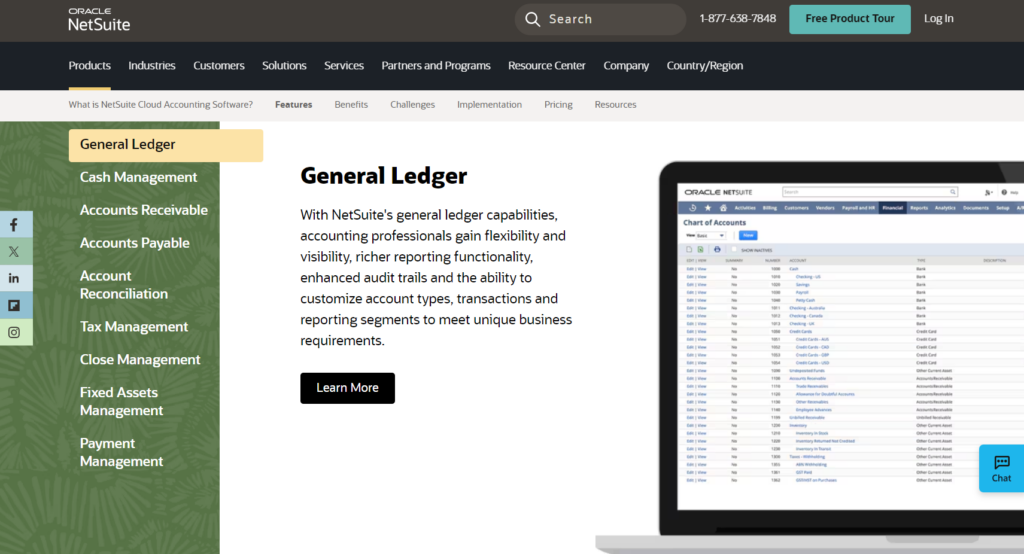
Understand the Pricing Structure: NetSuite’s pricing is based on three main components: the core platform, optional modules, and the number of users. Familiarize yourself with what each element includes and focus on what your business needs. Start with the essentials and only add modules as requirements to avoid unnecessary costs. You can get direct and current information from the sales team. Use the NetSuite Sales Chatbot to contact the sales team.
Negotiate the License Fee: Since NetSuite operates on an annual subscription model, there’s room to negotiate your license fee. Consider your long-term business goals and opt for multi-year contracts so you can get better rates. Be sure to ask for discounts or promotional offers during your discussions with sales representatives.
Optimize Implementation Costs: A one-time implementation fee is necessary for the initial setup. To keep this fee manageable, prepare your internal team ahead of time and have a clear understanding of your requirements. Minimizing back-and-forths during implementation can save you both time and money.
Scale as You Grow: One of the advantages of cloud software is scalability. Begin with the most critical modules for your business, and as your company grows, activate additional modules or add users as you require. This approach helps you avoid overinvesting upfront.
Leverage In-House Expertise or Partners: If you’re working with an accounting firm, inquire whether it is part of the SuiteAccountants program. This allows your accountant to use a free license to manage your NetSuite account, reducing your overall subscription costs.
Monitor Usage and Adjust Accordingly: Keep track of how many users are actually using the system and whether your business makes use of all the extra modules. If not, adjust your subscription accordingly during renewal to avoid paying for redundant features.
Can You Afford NetSuite Accounting Software Prices?
When considering NetSuite cloud accounting software, it’s important to assess whether the cost aligns with your business budget and goals. Here’s how you can determine if NetSuite is the right financial fit:
First, what is your business’s financial capacity? NetSuite’s pricing model relies on an annual license fee, which varies depending on the core platform, optional modules, and the number of users you subscribe for. Understanding how much you’re able to invest in accounting software guides your decision-making.
Second, how important is advanced automation to your accounting needs? If your business is looking to simplify processes like accounts receivable, tax management, or financial reporting, NetSuite’s robust capabilities are well worth the cost to help you significantly reduce manual work and improve accuracy.
Lastly, consider long-term scalability. As your company grows, NetSuite allows you to easily add users and modules, which makes it a future-proof solution. However, if your business is just opening shop, explore whether the investment is essential now or if a more affordable, smaller-scale option suffices in the short term.
Finally: Should You Get NetSuite Accounting Software or Not?
NetSuite Cloud Accounting Software offers you a comprehensive suite of tools that simplify your accounting processes, enhance accuracy, and provide real-time insights into your business’s financial well-being. With features like automation for repetitive tasks and seamless integration with other business functions like HR operations and inventory management, it’s a solid choice for your company.
Nevertheless, it comes with significant conditions for your investment in terms of licensing and implementation costs. If you own a growing business that needs robust, scalable solutions and you’re ready to commit to an all-inclusive platform, NetSuite is definitely worth your attention. However, if you have a small business with more basic accounting standards or a small budget, it may be wise to explore more affordable alternatives first.
Ultimately, NetSuite is a powerful solution, but you need to confirm if it is the best fit for your company using your company size, growth trajectory, and financial priorities.



